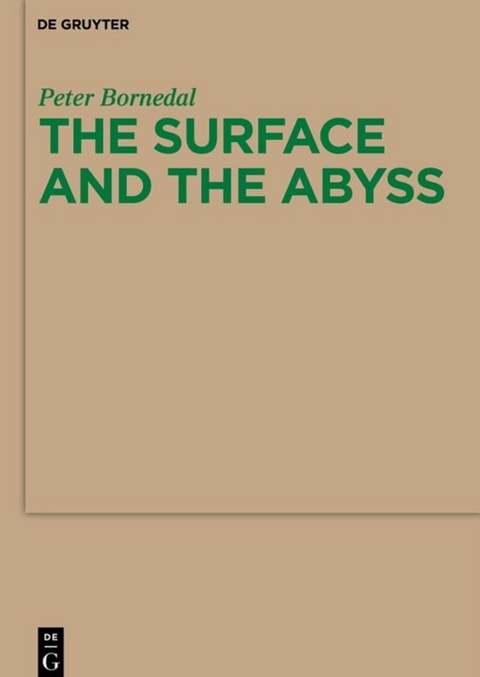
The Surface and the Abyss
Nietzsche as Philosopher of Mind and Knowledge
Seiten
2016
De Gruyter (Verlag)
978-3-11-048160-0 (ISBN)
De Gruyter (Verlag)
978-3-11-048160-0 (ISBN)
Die Reihe Monographien und Texte zur Nietzsche-Forschung (MTNF) setzt seit mehreren Jahrzehnten die Agenda in der sich stetig Nietzsche-Forschung. Die Bände sind interdisziplinär und international ausgerichtet und spiegeln das gesamte Spektrum der Nietzsche-Forschung wider, von der Philosophie über die Literaturwissenschaft bis zur politischen Theorie. Die Monographien und Sammelbände unterliegen jeweils einem strengen Peer-Review.
Peter Bornedal provides an interpretation of Nietzsche’s philosophy as a whole in the context of 19th century philosophy of mind and cognition. The study explains Nietzsche’s notion of truth; his epistemology; his notions of the split and fragmented subject, of master, slave, and priest; furthermore, it offers a new interpretation of the enigmatic “eternal recurrence”. It also suggests how important aspects of Nietzsche’s thinking can be read as a sophisticated critique of ideology. From studies in Nietzsche’s work as a whole, not least in his so-called Nachgelassene Fragmente, the book reconstructs aspects of Nietzsche’s thinking that have largely been under-described in especially the Anglo-Saxon Nietzsche-reception. The study makes the case that Nietzsche in his epistemology, his psychology, and his cognitive theory is responding to several scientific discoveries occuring during the 19th century. Read within the context of contemporary cognitive-psychological-evolutionary debates, Nietzsche’s philosophy is seen as far more scientistic, and far less poetical-metaphysical, than it has in recent reception-history been received.
Peter Bornedal provides an interpretation of Nietzsche’s philosophy as a whole in the context of 19th century philosophy of mind and cognition. The study explains Nietzsche’s notion of truth; his epistemology; his notions of the split and fragmented subject, of master, slave, and priest; furthermore, it offers a new interpretation of the enigmatic “eternal recurrence”. It also suggests how important aspects of Nietzsche’s thinking can be read as a sophisticated critique of ideology. From studies in Nietzsche’s work as a whole, not least in his so-called Nachgelassene Fragmente, the book reconstructs aspects of Nietzsche’s thinking that have largely been under-described in especially the Anglo-Saxon Nietzsche-reception. The study makes the case that Nietzsche in his epistemology, his psychology, and his cognitive theory is responding to several scientific discoveries occuring during the 19th century. Read within the context of contemporary cognitive-psychological-evolutionary debates, Nietzsche’s philosophy is seen as far more scientistic, and far less poetical-metaphysical, than it has in recent reception-history been received.
Peter Bornedal, American University of Beirut, Lebanon.
| Erscheinungsdatum | 20.06.2016 |
|---|---|
| Reihe/Serie | Monographien und Texte zur Nietzsche-Forschung ; 57 |
| Verlagsort | Berlin/Boston |
| Sprache | englisch |
| Maße | 170 x 240 mm |
| Gewicht | 1037 g |
| Themenwelt | Geisteswissenschaften ► Philosophie ► Erkenntnistheorie / Wissenschaftstheorie |
| Geisteswissenschaften ► Philosophie ► Philosophie der Neuzeit | |
| Geisteswissenschaften ► Philosophie ► Sprachphilosophie | |
| Schlagworte | Bewusstsein • Cognition • Consciousness • Erkenntnis • Friedrich • Knowledge • Kognition • Mind • Nietzsche • Nietzsche, Friedrich • Philosophie des Geistes • Verstand • Wissen |
| ISBN-10 | 3-11-048160-X / 311048160X |
| ISBN-13 | 978-3-11-048160-0 / 9783110481600 |
| Zustand | Neuware |
| Haben Sie eine Frage zum Produkt? |
Mehr entdecken
aus dem Bereich
aus dem Bereich
die Grundlegung der modernen Philosophie
Buch | Softcover (2023)
C.H.Beck (Verlag)
CHF 25,20
Buch | Softcover (2023)
Reclam, Philipp (Verlag)
CHF 9,80


![Was heißt Denken?. Vorlesung Wintersemester 1951/52. [Was bedeutet das alles?] - Martin Heidegger](/media/113619842)